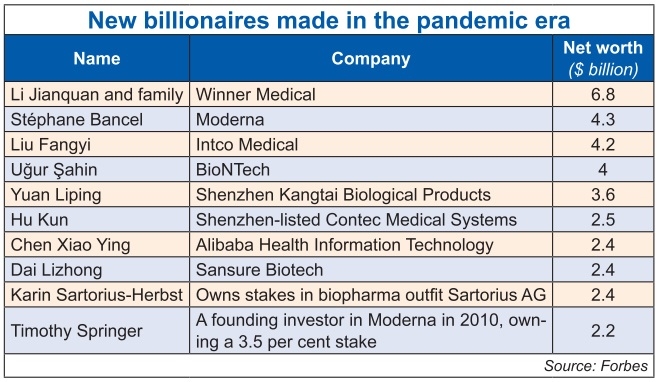Wealthy gain as world demands fair access
G20 Health Summit on May 21 looked set to call for voluntary licensing and technology transfers to enable a rapid increase in vaccine production, but sidestepped a push from the United States and other nations to waive valuable patents for shots. US pharma giants Pfizer, Moderna, and Johnson & Johnson instead said that they will supply around 3.5 billion vaccine doses at cost or discount to middle- and low-income countries this year and next.
 |
A representative of Pfizer told VIR, “Pfizer and BioNTech are firmly committed to equitable and affordable access for COVID-19 vaccines for people around the world.”
He added that in all agreements, the pair are deploying a tiered pricing structure for high, middle, and lower middle-income countries. “High and middle-income countries will pay more than low/lower-middle income countries, but at a value that is significantly discounted from our normal benchmarks during the pandemic. Low/lower-middle income countries will pay a not-for-profit price.”
Pfizer, however, gave no comments to VIR about whether or not it supports the call from the People’s Vaccine Alliance on need to urgently end monopolies of COVID-19 vaccine patents.
Pfizer has confirmed supply of 2.5 billion doses in 2021, but aims to produce three billion doses this year, and will continue to make investments and process improvements to enable more capacity next year. Two billion doses will be delivered to low- and middle-income countries over the next 18 months through bilateral agreements and deals with supranational organisations as well as in partnership with the COVAX vaccine-sharing programme.
“Pfizer remains firmly committed to support Vietnam in its fight against the pandemic. We are in discussions with the Vietnamese government to make our Pfizer-BioNTech vaccine available for use in the country,” he attributed. “We look forward to working with governments, the World Trade Organization (WTO), and other stakeholders on solutions that will address the challenges of vaccine access that do not undermine the intellectual property system and vaccine production, or negatively impact public health.”
Like Pfizer, Moderna and Johnson & Johnson at the summit also did similar pledge. Moderna CEO Stephane Bancel announced “up to 95 million doses for 2021 and up to 900 million for 2022”, including through the COVAX programme.
Paul Stoffels, vice chairman of Johnson & Johnson, said the company had a deal with COVAX for up to 200 million doses in 2021, and was discussing “the potential supply of an additional 300 million”.
Meanwhile, French pharmaceutical giant Sanofi, which is collaborating with Britain’s GSK, is proceeding with clinical trials of their COVID-19 jab, raising hopes it could be added to the world’s vaccine arsenal.
A Sanofi spokesperson told VIR, “Our priority is on the science that is needed to develop vaccines that are safe and effective. We are committed to develop effective COVID-19 vaccines and to manufacture them on a massive scale. We are also committed to working with governments, partners, and payers to ensure that when new vaccines are approved, we make them accessible and affordable for people across the world.”
Nonetheless, the waiver of patents for COVID-19 vaccines might be the key to boost production and allow for a more equitable distribution of shots across the globe.
It was reported at the summit that over 80 per cent of the first billion shots went to wealthy countries, compared to just 0.2 per cent for low-income nations.
Earlier this month, the US backed proposals by South Africa and India at the WTO to temporarily break up these monopolies and lift the patents on COVID-19 vaccines. This move has the support of over 100 developing countries. In spite of this, other wealthier nations are still blocking the proposal, putting the interests of pharmaceutical companies first.
Winnie Byanyima, executive director of the Joint UN Programme on HIV/AIDS, said: “While the companies making massive profits from COVID-19 vaccines are refusing to share their science and technology with others in order to increase the global vaccine supply, the world continues to face the very real risk of mutations that could render the vaccines we have ineffective and put everyone at risk all over again.”
Ahead of the summit, the People’s Vaccine Alliance announced that at least nine people have become billionaires since the beginning of the pandemic, thanks to the excessive profits being made by pharmaceutical corporations with monopolies on vaccines.
The new billionaires have a combined net wealth of $19.3 billion, enough to fully vaccinate all people in low-income countries 1.3 times. Topping the list are the CEOs of Moderna and BioNTech.
What the stars mean:
★ Poor ★ ★ Promising ★★★ Good ★★★★ Very good ★★★★★ Exceptional
Themes: Healthcare Platform
- Hanoi intensifies airport monitoring amid Nipah disease risks
- Cosmetics rules set for overhaul under draft decree
- Policy obstacles being addressed in drug licensing and renewal
- Sanofi, Long Chau Pharmacy relaunch medicine blister pack collection initiative
- Takeda Vietnam awarded for ongoing support of Vietnam’s sustainability efforts
Related Contents
Latest News
More News
- State corporations poised to drive 2026 growth (February 03, 2026 | 13:58)
- Why high-tech talent will define Vietnam’s growth (February 02, 2026 | 10:47)
- FMCG resilience amid varying storms (February 02, 2026 | 10:00)
- Customs reforms strengthen business confidence, support trade growth (February 01, 2026 | 08:20)
- Vietnam and US to launch sixth trade negotiation round (January 30, 2026 | 15:19)
- Digital publishing emerges as key growth driver in Vietnam (January 30, 2026 | 10:59)
- EVN signs key contract for Tri An hydropower expansion (January 30, 2026 | 10:57)
- Vietnam to lead trade growth in ASEAN (January 29, 2026 | 15:08)
- Carlsberg Vietnam delivers Lunar New Year support in central region (January 28, 2026 | 17:19)
- TikTok penalised $35,000 in Vietnam for consumer protection violations (January 28, 2026 | 17:15)

 Tag:
Tag:




















 Mobile Version
Mobile Version